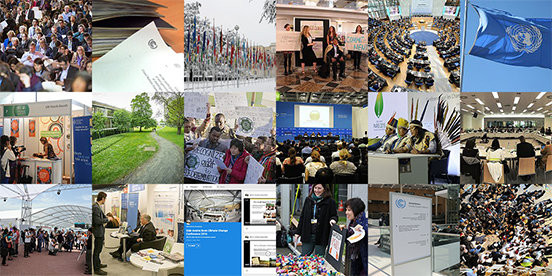Parties
The Convention divides countries into three main groups according to differing commitments:
Annex I Parties include the industrialized countries that were members of the OECD (Organisation for Economic Co-operation and Development) in 1992, plus countries with economies in transition (the EIT Parties), including the Russian Federation, the Baltic States, and several Central and Eastern European States.
Annex II Parties consist of the OECD members of Annex I, but not the EIT Parties. They are required to provide financial resources to enable developing countries to undertake emissions reduction activities under the Convention and to help them adapt to adverse effects of climate change. In addition, they have to "take all practicable steps" to promote the development and transfer of environmentally friendly technologies to EIT Parties and developing countries. Funding provided by Annex II Parties is channeled mostly through the Convention’s financial mechanism.
Non-Annex I Parties are mostly developing countries. Certain groups of developing countries are recognized by the Convention as being especially vulnerable to the adverse impacts of climate change, including countries with low-lying coastal areas and those prone to desertification and drought. Others (such as countries that rely heavily on income from fossil fuel production and commerce) feel more vulnerable to the potential economic impacts of climate change response measures. The Convention emphasizes activities that promise to answer the special needs and concerns of these vulnerable countries, such as investment, insurance and technology transfer.
The 46 Parties classified as least developed countries (LDCs) by the United Nations are given special consideration under the Convention on account of their limited capacity to respond to climate change and adapt to its adverse effects. Parties are urged to take full account of the special situation of LDCs when considering funding and technology-transfer activities.
Non-Party stakeholders
These are entities and individuals not classified as Parties or Observer States to the Convention but are actively involved in its processes. Their contributions are vital to shaping policy and advancing implementation efforts.
Non-Party stakeholders engage through Observer organizations.
As stipulated in Article 7, paragraph 6 of the UNFCCC, these entities may be represented at sessions of the Conference of the Parties as observers with Rule 6, Rule 7, and Rule 8 of the draft Rules of Procedure being applied. Observer organizations are categorized into three types:
- United Nations System and its Specialized Agencies: These organizations can be represented as observers.
- Intergovernmental Organizations (IGOs) admitted by the COP: IGOs can be represented as observers once admitted by the COP. These organizations must go through a formal application process to obtain observer status, which then allows them to register delegates and contribute to the sessions.
- Non-governmental Organizations (NGOs) admitted by the COP: NGOs which are qualified in matters covered by the Convention, and which has informed the secretariat of its wish to be represented at a session of the Conference of the Parties as an observer, may be so admitted unless at least one third of the Parties present object. The process for NGOs to obtain observer status is detailed on the webpage How to obtain observer status.
- Other non-Party Stakeholders: Non-Party stakeholders without observer status can engage with the UNFCCC process through various means. They can contribute to the climate dialogue by participating in regional workshops, contributing to technical papers, and engaging in public participation initiatives aimed at broadening the scope of climate action discussions.

Disclaimer
The UNFCCC secretariat has become aware that certain admitted observer organizations are using commercial business model packages to solicit business. As an inducement to sell these packages, potential clients are assured participation at UNFCCC conferences, sessions and meetings through quotas of admitted observer organizations. The UNFCCC secretariat would like to make clear that it does not endorse such practices nor does it charge any fees to anyone for participating in the UNFCCC process. Eligible participants are accredited only by the UNFCCC secretariat who upon issue of badges by the UNFCCC secretariat can enter conference, sessions and meetings venue and participate, subject to the relevant rules and regulations, in the activities organized by the UNFCCC secretariat including the UNFCCC side events and exhibits.